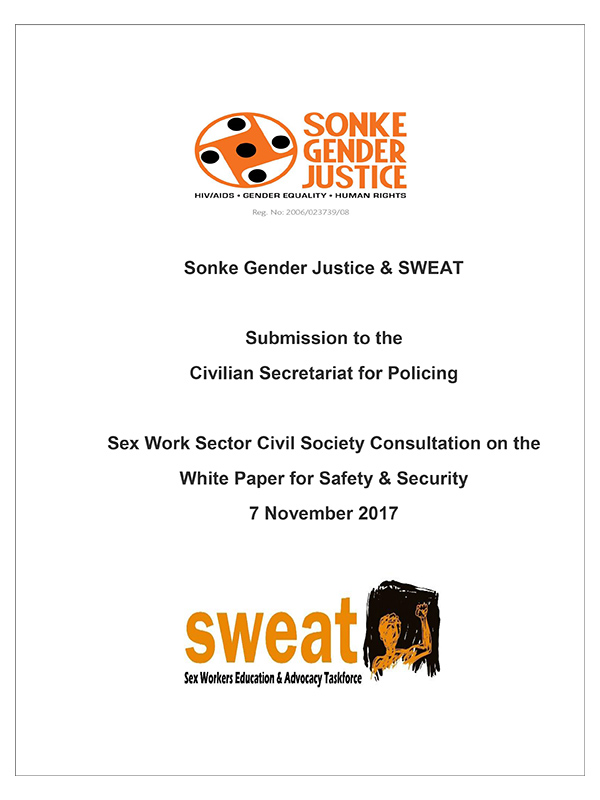South African Parental Leave judgment October 2023 (Van Wyk and others Vs Minister of Employment and labour with amici case no 017842-2022)
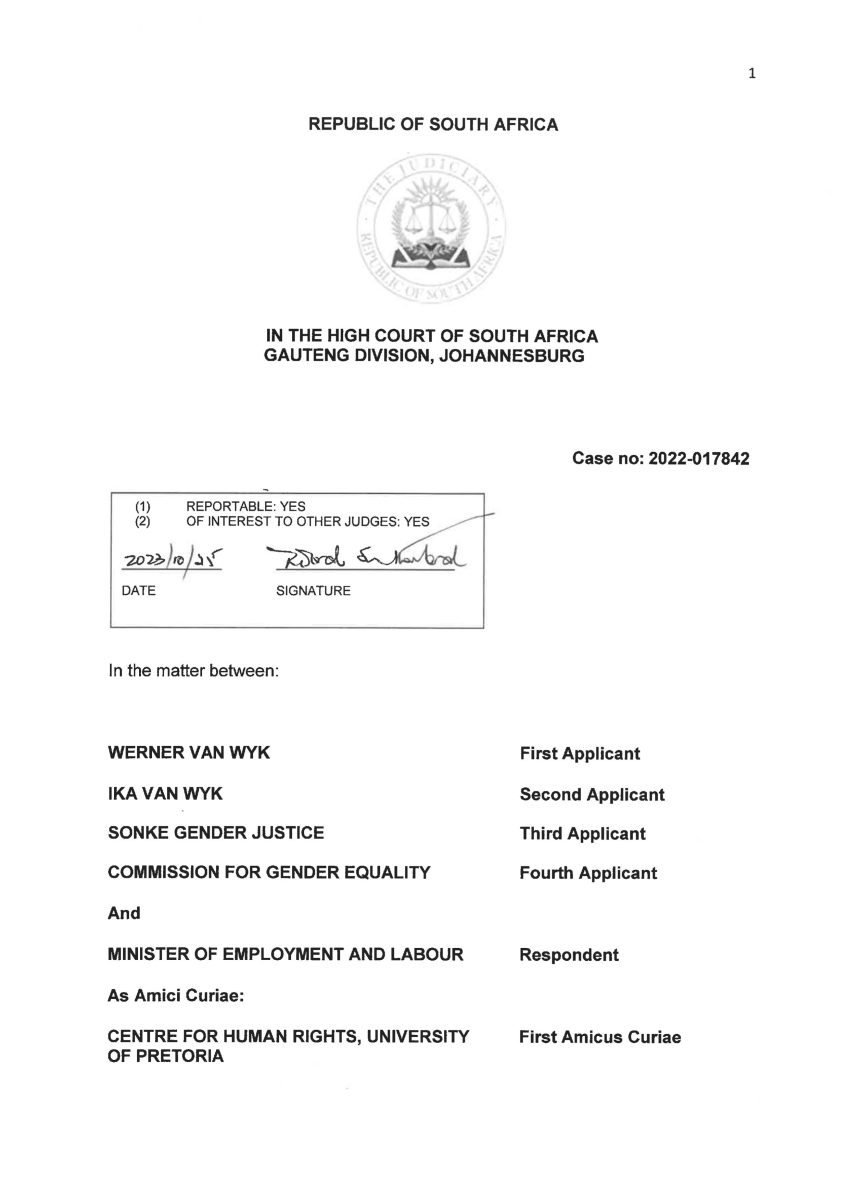
The Johannesburg High Court has handed down a judgement that will now see South African fathers enjoy up to four months of parental leave and associated Unemployment Insurance Fund benefits. The matter was brought to court by a Polokwane couple, Werner and Ika van Wyk, with Sonke Gender Justice and the Commission for Gender Equality among other organisations […]
Submissions with respect to the Prevention of Hate Crimes and Hate Speech Bill B9-2018
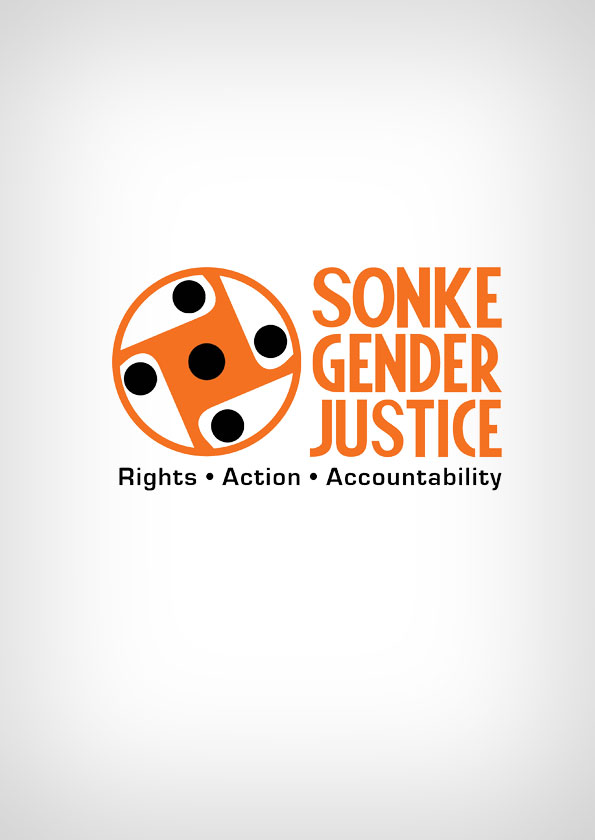
Sonke welcomes the publication of the Prevention of Hate Crimes and Hate Speech Bill (The Bill) by the Department of Justice and Constitutional Affairs. Sonke further welcomes the opportunity given to the public to provide comments and recommendations. We believe given the complexity and frequent occurrences of hate crimes and hate speech, the finalisation of […]
Submissions on the Children’s Amendments Bill B18-2020
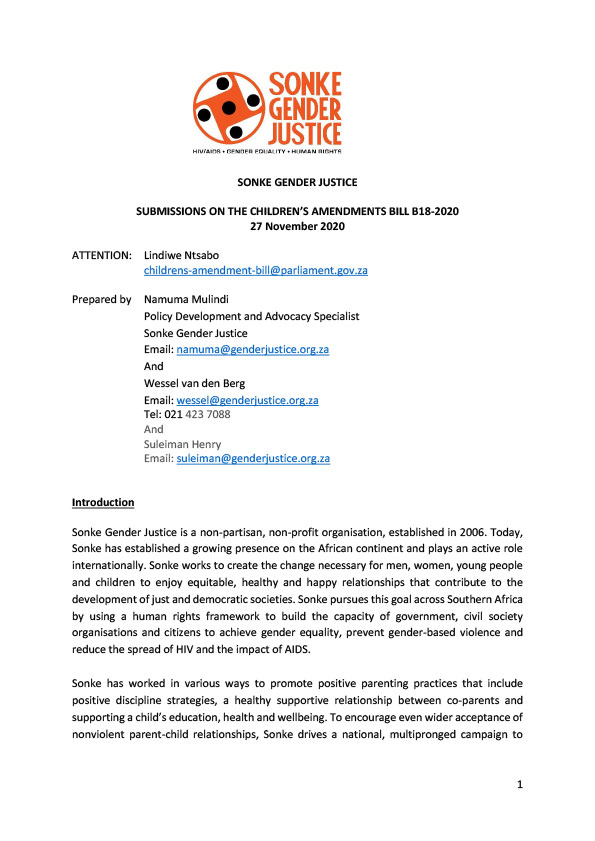
Sonke Gender Justice is a non-partisan, non-profit organisation, established in 2006. Today, Sonke has established a growing presence on the African continent and plays an active role internationally. Sonke works to create the change necessary for men, women, young people and children to enjoy equitable, healthy and happy relationships that contribute to the development of […]
Submissions with respect to the Criminal Law Sexual Offences & Related Matters Act Amendment Bill [B 16-2020]
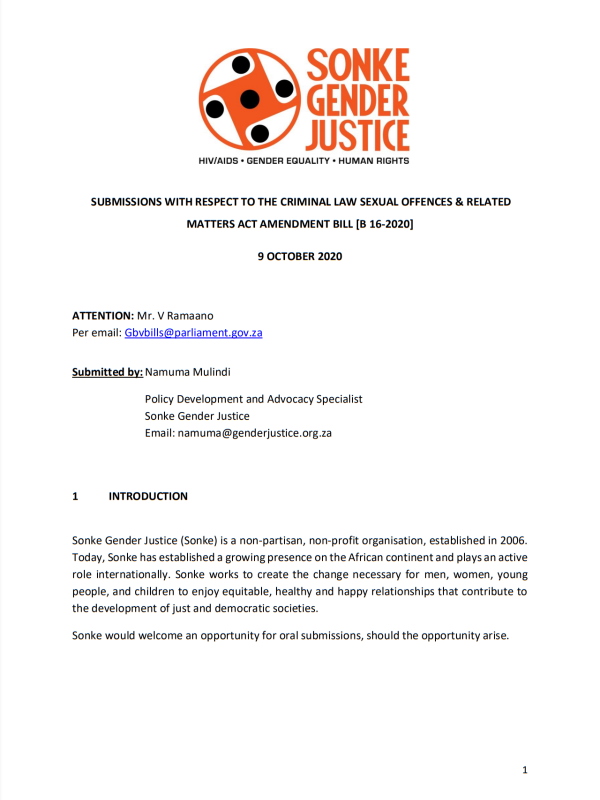
The South African Constitution has been regarded as one of the most progressive constitutions in the world. The esteemed Ruth Bader Ginsburg during her tenure as a US Supreme Court Justice is on record for having said, “That was a deliberate attempt to have a fundamental instrument of government that embraced basic human rights, had […]
Submissions with respect to the call for public comment on the Gauteng Com Oversightbill
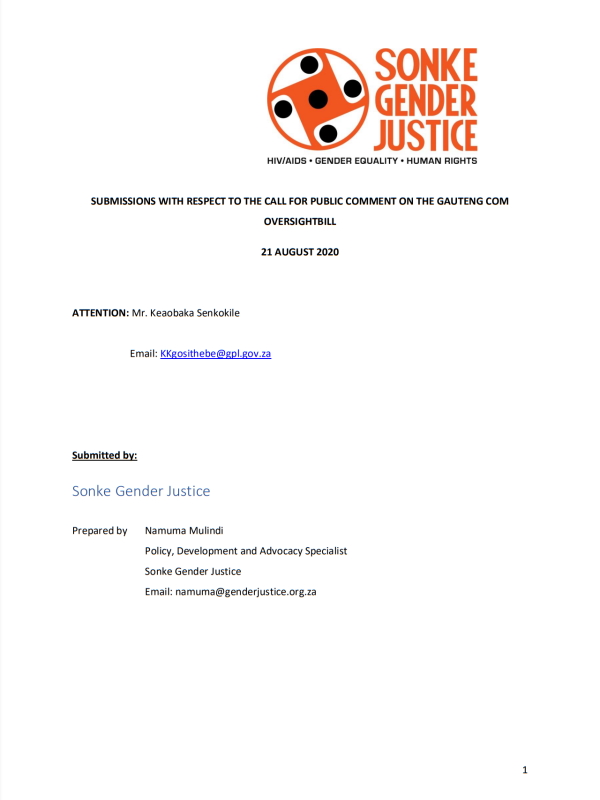
This submission analyses the Community Safety Bill considering the White Paper on Safety and Security (White Paper) endorsed by Cabinet in April 2016. The White Paper provides a strategic policy level and integrated approach for community safety, crime prevention and addressing violence in accordance with the National Development Plan’s objective of “Building Safer Communities”. The […]
Submissions with respect to the Prescription in Civil and Criminal Matters (Sexual Offences) Amendment Bill [B 22b-2019]
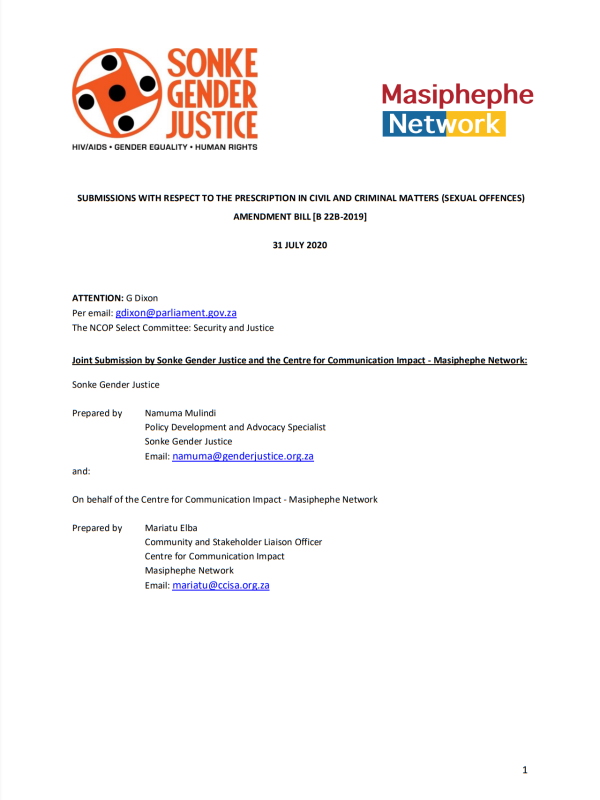
The Constitutional Court’s decision in Levenstein and Others v Estate of the Late Sidney Lewis Frankel and Others 2018 ZACC 16 placed an onus on Parliament to enact remedial legislation within 24 months that would bring into effect its ruling on the unconstitutionality of Section 18 of the Criminal Procedure Amendment Act of 1977. Section […]
Joint Submission on COVID-19 and the Increase of Domestic Violence Against Women
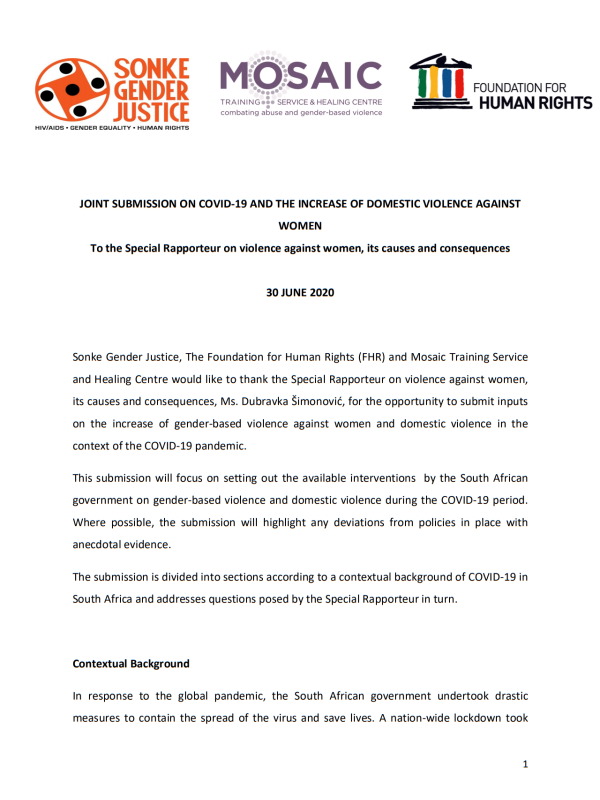
Sonke Gender Justice, The Foundation for Human Rights (FHR) and Mosaic Training Service and Healing Centre would like to thank the Special Rapporteur on violence against women, its causes and consequences, Ms. Dubravka Šimonović, for the opportunity to submit inputs on the increase of gender-based violence against women and domestic violence in the context of […]
Submissions on the Draft National Youth Policy 2020-2030
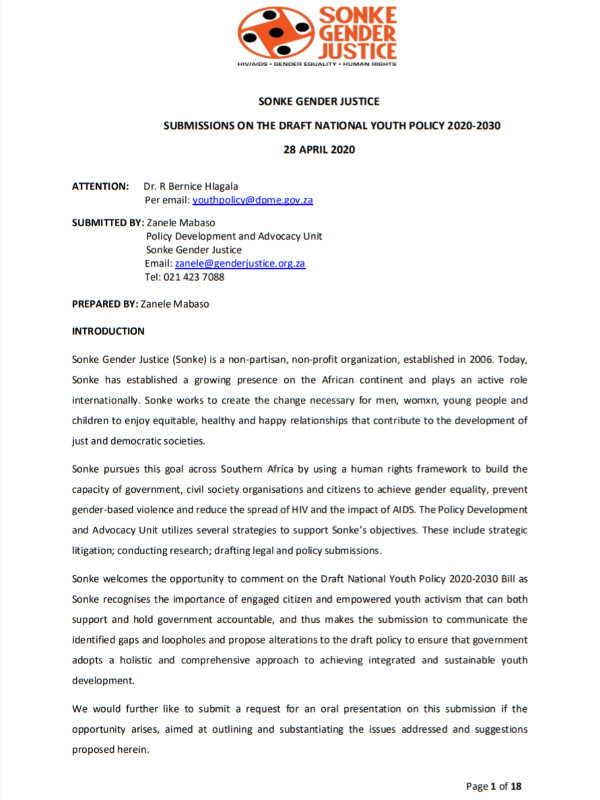
Sonke Gender Justice (Sonke) is a non-partisan, non-profit organization, established in 2006. Today, Sonke has established a growing presence on the African continent and plays an active role internationally. Sonke works to create the change necessary for men, womxn, young people and children to enjoy equitable, healthy and happy relationships that contribute to the development […]
Submission to the Department of Justice and Correctional Services regarding the Criminal Matters Amendment Draft Bill, 2020
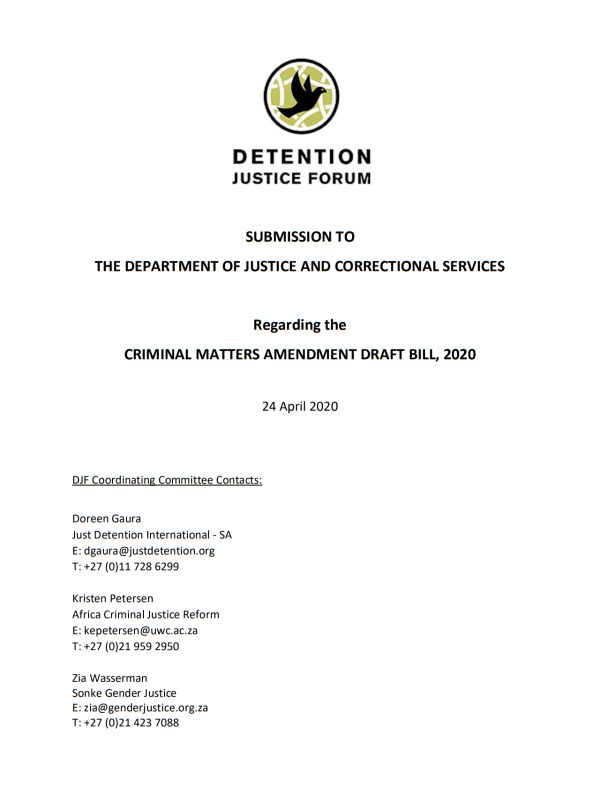
The Detention Justice Forum (‘DJF’) is a civil society coalition of non-governmental organisations and individuals working to ensure that the rights and well-being of those who are detained are respected and upheld, as enshrined under the South African Constitution, laws, and regional and international human rights norms and standards. Our membership includes community organisations, lawyers, […]
Submissions on the Domestic Violence Amendment Bill

Sonke Gender Justice (Sonke) is a non-partisan, non-profit organisation, established in 2006. Today, Sonke has established a growing presence on the African continent and plays an active role internationally. Sonke works to create the change necessary for men, womxn, young people and children to enjoy equitable, healthy and happy relationships that contribute to the development […]
Submission to the Department of Correctional Services and the Portfolio Committee for Justice and Correctional Services
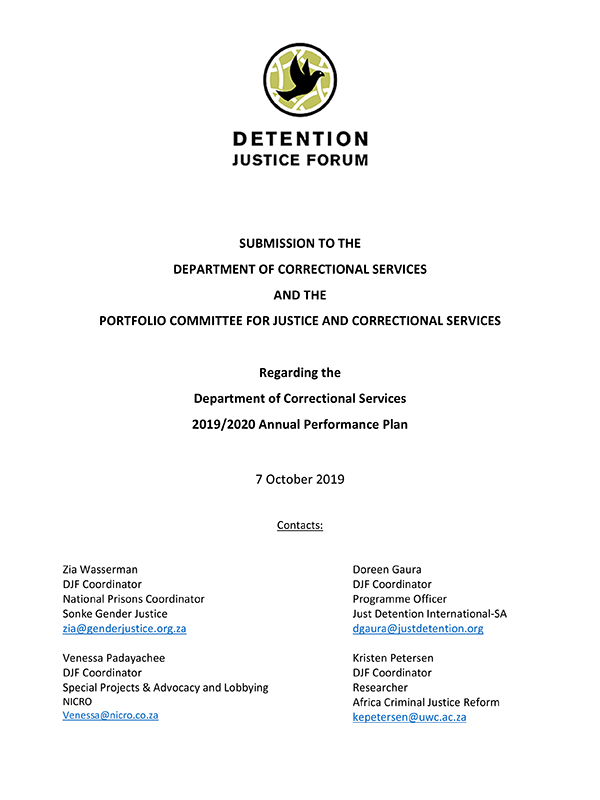
The Detention Justice Forum (DJF) is a civil society coalition of non-governmental organisations and individuals working to ensure that the rights and well-being of those who are detained are respected and upheld, as enshrined under the South African Constitution, laws, and regional and international human rights norms and standards. Our membership includes community organisations, lawyers, […]
Sonke Gender Justice Submissions on the White Paper on Home Affairs
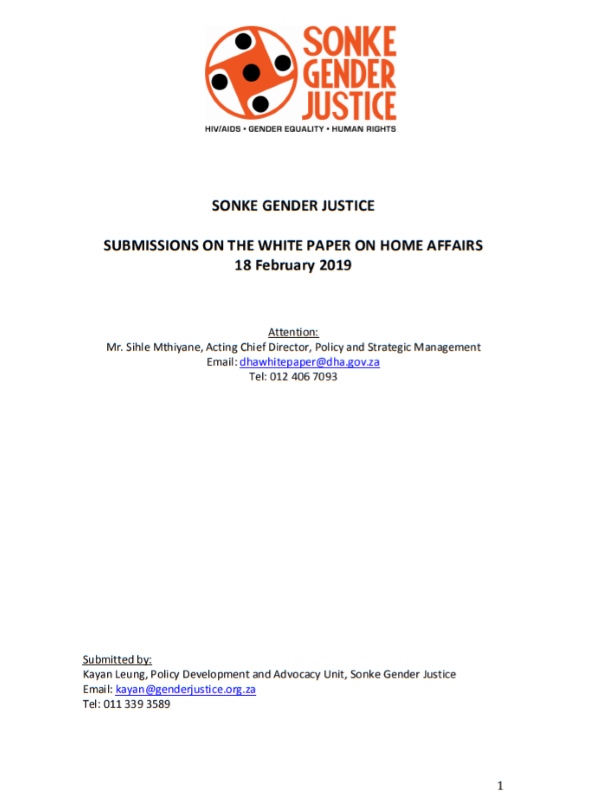
The framework centers around three mandates of the Department of Home Affairs (DHA) namely to manage the official identity and status of persons, manage international migration and to manage asylum seekers and refugees. This White Paper attempts to address previous historical gaps in the DHA by “replacing the current model by repositioning the Department of […]
Submission of the Hate Crimes Working Group
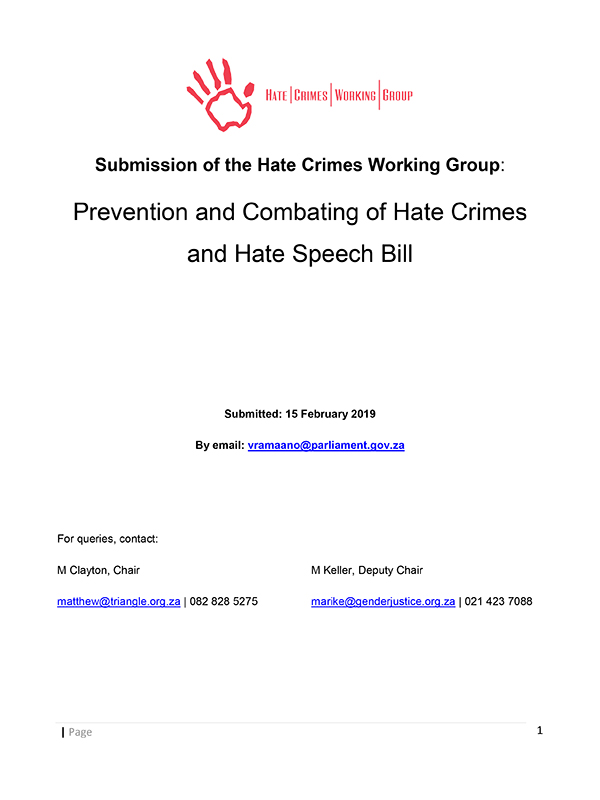
The Hate Crimes Working Group (HCWG) welcomes the opportunity to make submissions on the draft Prevention and Combating of Hate Crimes and Hate Speech Bill (the Bill). We are very pleased to have the opportunity to engage with this long-awaited and crucial piece of legislation and look forward to engaging further with the Portfolio Committee […]
Submissions on the Civil Union Amendment Act
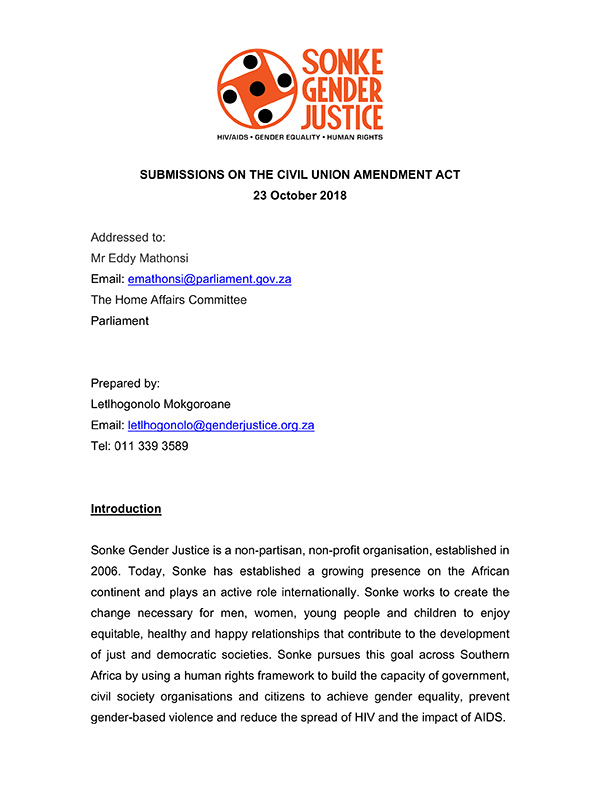
In 2016, the Department of Home Affairs released a list of offices across South Africa that solemnise same-sex marriages. The list revealed that only 117 of the 409 offices nationwide will solemnise marriages of same-sex couples. This means that 28,6% of marriage officers are willing to solemnise marriages between same-sex couples. The implementation of this […]
Submissions on the Third Children’s Amendments Bill
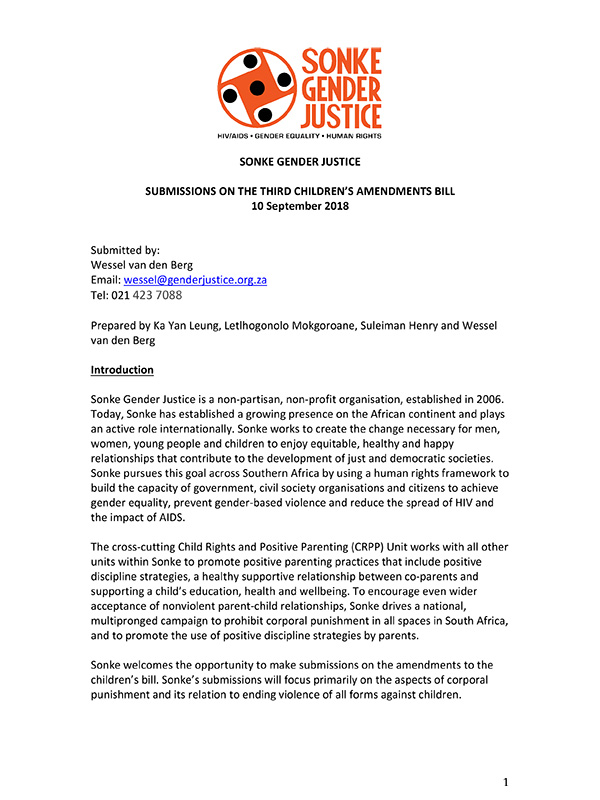
Sonke welcomes the opportunity to make submissions on the amendments to the children’s bill. Sonke’s submissions will focus primarily on the aspects of corporal punishment and its relation to ending violence of all forms against children.
Continuous breach of the Code of Ethical Conduct and Disclosure of Members’ Interests for Assembly and Permanent Council Members by Honourable Member Mduduzi Manana
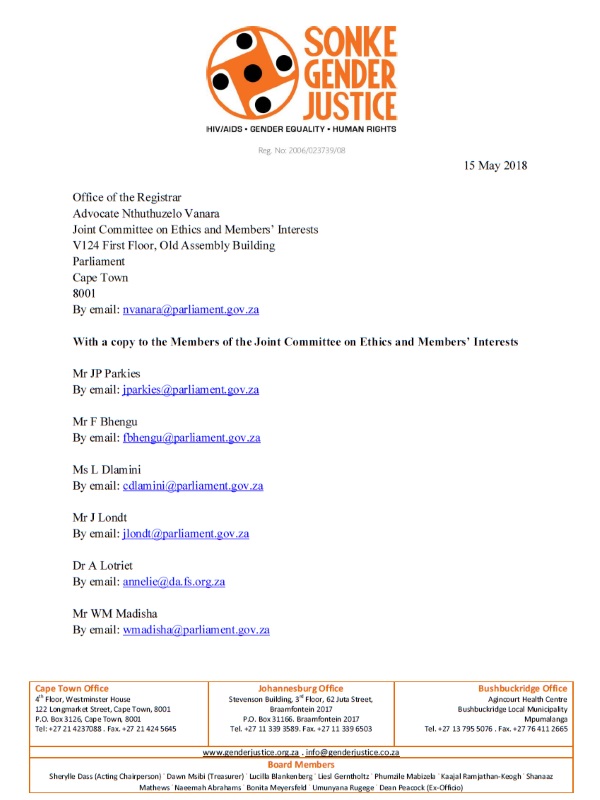
On or about 6 May 2018, it was reported that charges of assault were filed against Manana at the Douglasdale police station in relation to the assault of his former domestic worker, Ms Catherine Wiro (‘Wiro’). It is alleged that Manana pushed Wiro down the stairs. Despite Wiro having withdrawn the charges filed against Manana, […]
Submission to the Speaker of the National Assembly on The Civil Union Amendment Bill
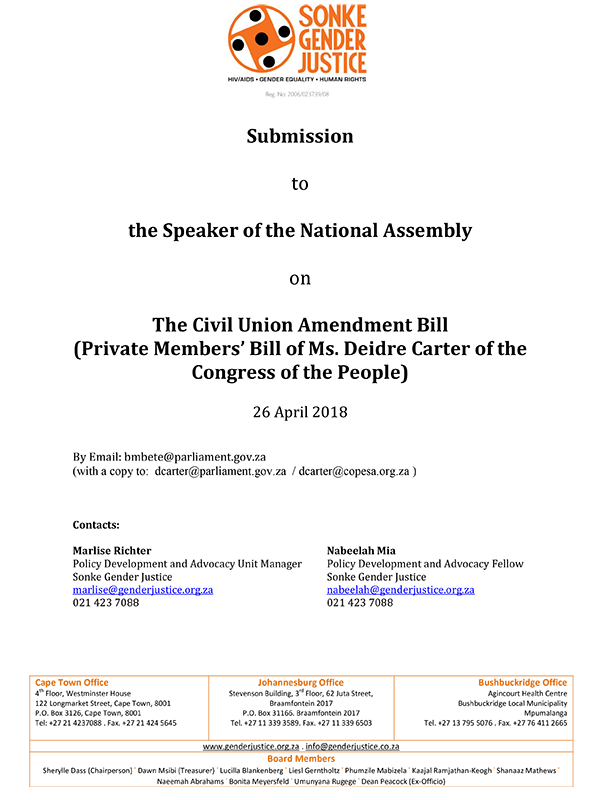
Sonke supports real marriage equality. The Civil Union Act extends recognition of marriage rights to two partners regardless of their gender and sex, thereby allowing same-sex partners the right to enter into a civil union. However, section 6 of the Civil Union Act remains problematic, and together with civil society partners, Sonke supports the removal […]
Signed Sonke letter of exemption request to US State Department, Feb 12 2018
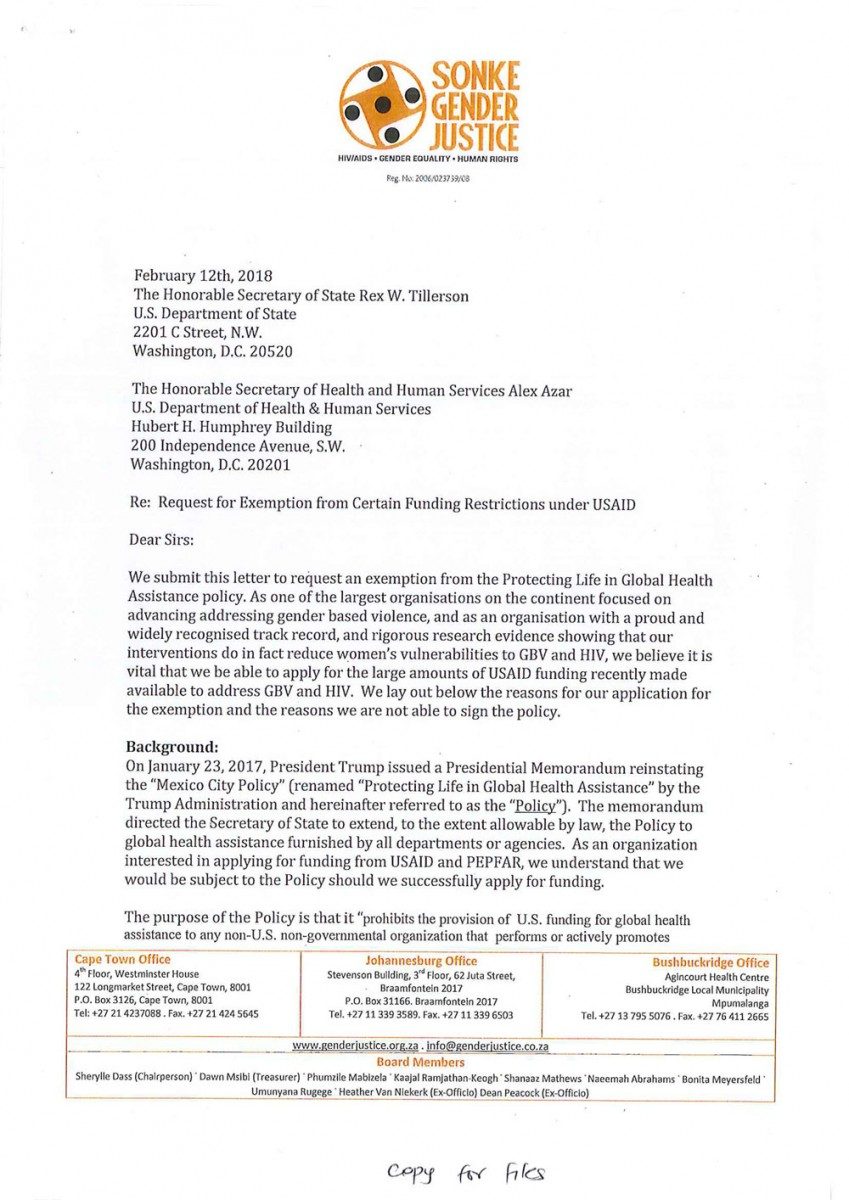
Sonke has chosen not to sign the Global Gag Rule because we know the costs it represents to women’s health and lives in South Africa and across the continent and the world. This means we, like many other organisations, can not apply for funding currently on offer from the US Government to address gender based […]
Submission to Multi-Party Women’s Caucus on South African Law Reform Commission (SALRC) Report 107 on Adult Prostitution
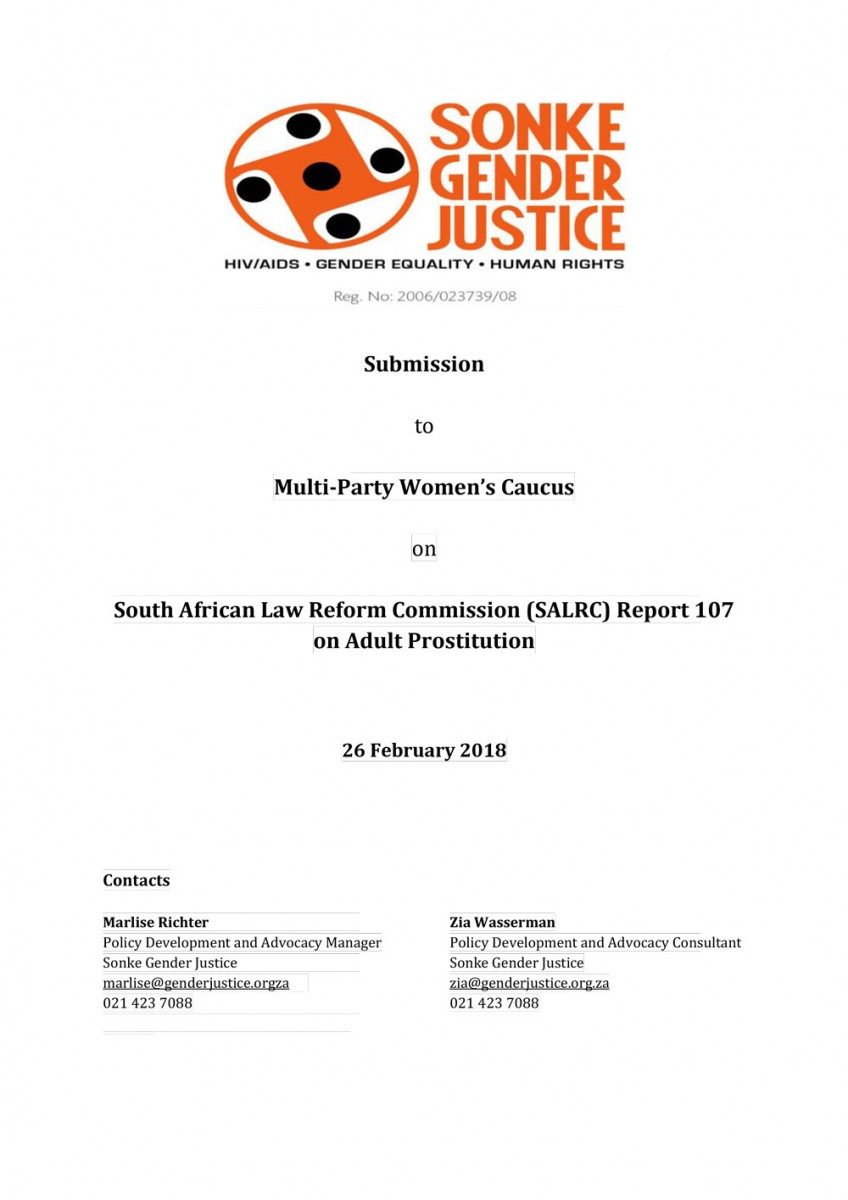
Parliament’s multi-party women’s caucus will host a summit on sex work on 5 March 5 in Parliament and have invited submissions. Background: https://www.news24.com/SouthAfrica/News/parliaments-womens-caucus-to-host-sex-work-summit-20180209
Letter to the City of Cape Town on Gender and Water
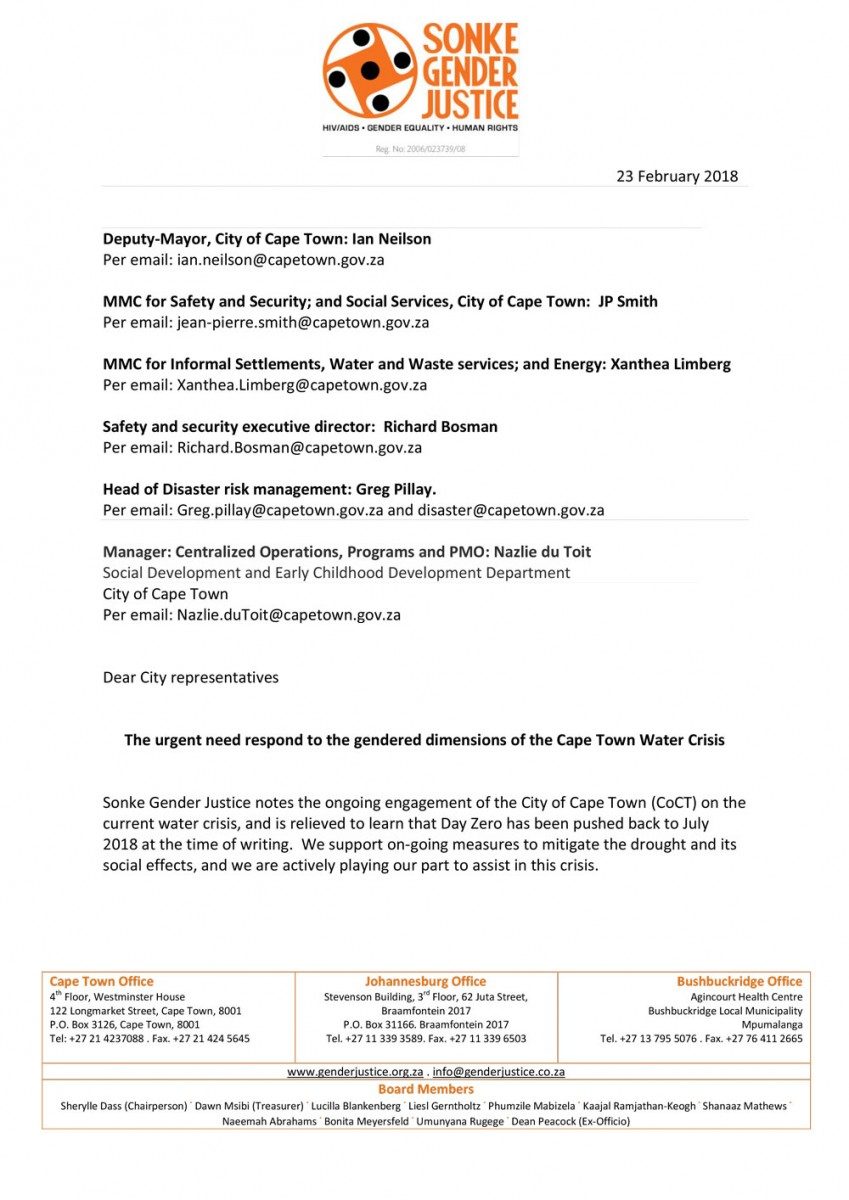
Sonke Gender Justice notes the ongoing engagement of the City of Cape Town (CoCT) on the current water crisis, and is relieved to learn that Day Zero has been pushed back to July 2018 at the time of writing. We support on-going measures to mitigate the drought and its social effects, and we are actively […]
Submission of Sonke Gender Justice: SAHRC national hearing on social cohesion and xenophobia in South Africa
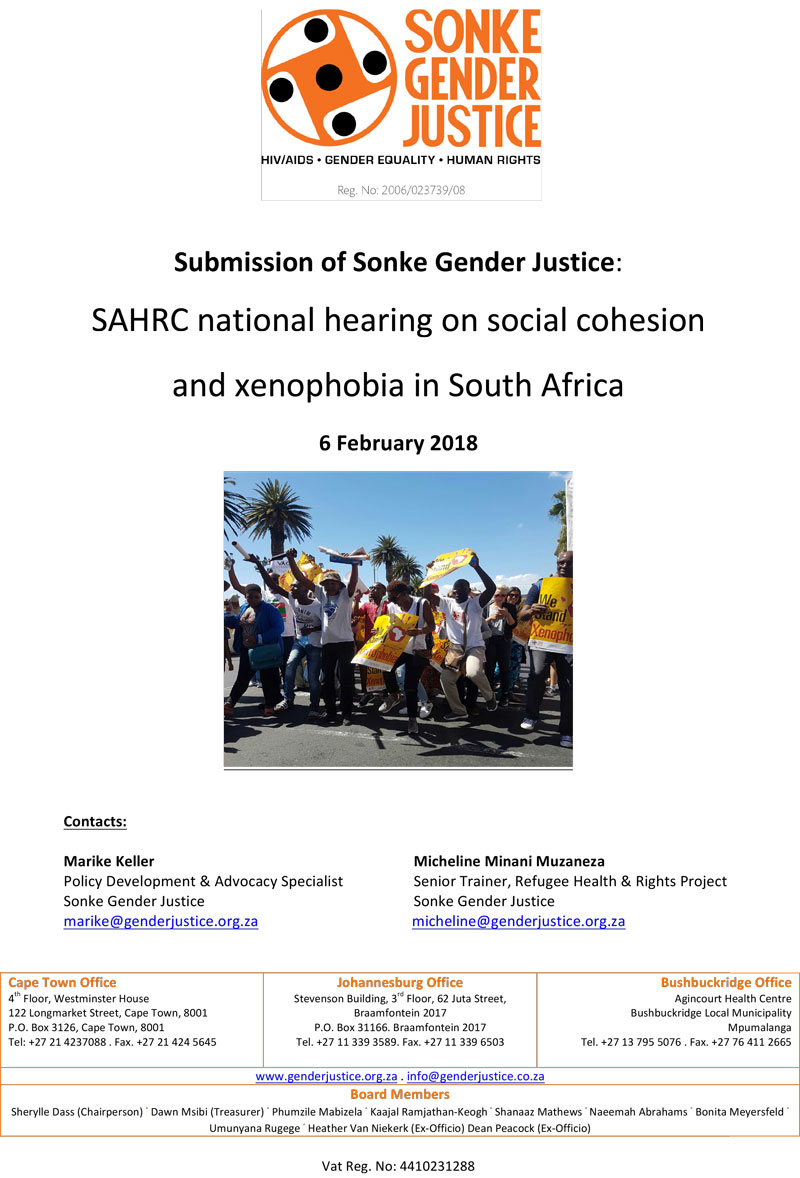
The South African Human Rights Commission’s (SAHRC) two-day national investigative hearings on migration, xenophobia and social cohesion held on 7 and 8 February 2018 calls on relevant government departments, regulatory bodies, civil society organisations, researchers, academics, media entities, and social commentators to contribute towards awareness-raising on issues pertaining to social inclusion of migrant communities in […]
Written Submission to the Civilian Secretariat for Police
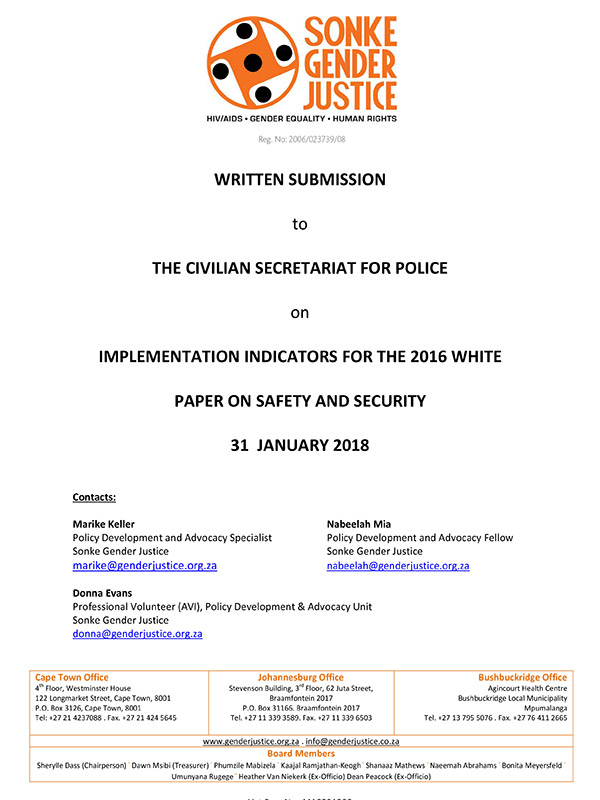
Sonke Gender Justice (Sonke) welcomes the opportunity to make this written submission to the Civilian Secretariat for Police (CSP) on the implementation of the 2016 White Paper on Safety and Security.
Residents of Gugulethu demand safety in our community
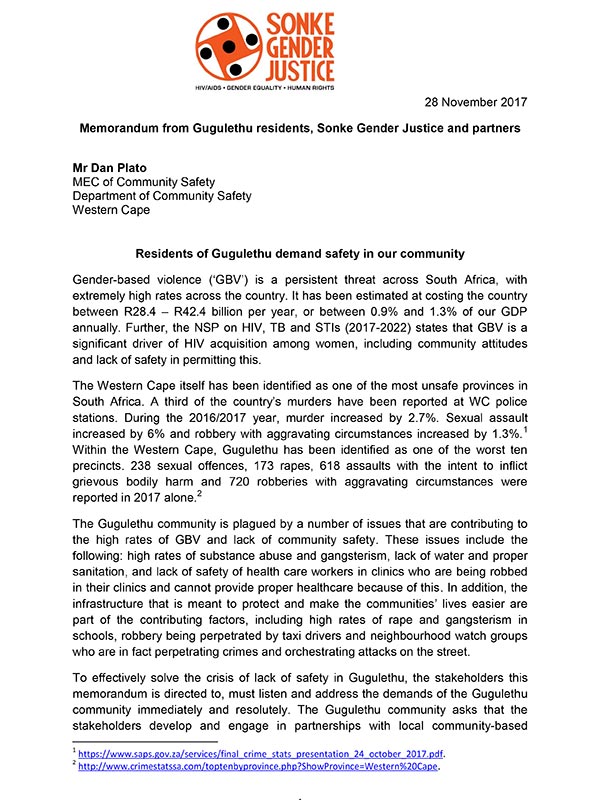
Gender-based violence (‘GBV’) is a persistent threat across South Africa, with extremely high rates across the country. It has been estimated at costing the country between R28.4 – R42.4 billion per year, or between 0.9% and 1.3% of our GDP annually. Further, the NSP on HIV, TB and STIs (2017-2022) states that GBV is a […]
Sex Work Sector Civil Society Consultation on the White Paper for Safety & Security
